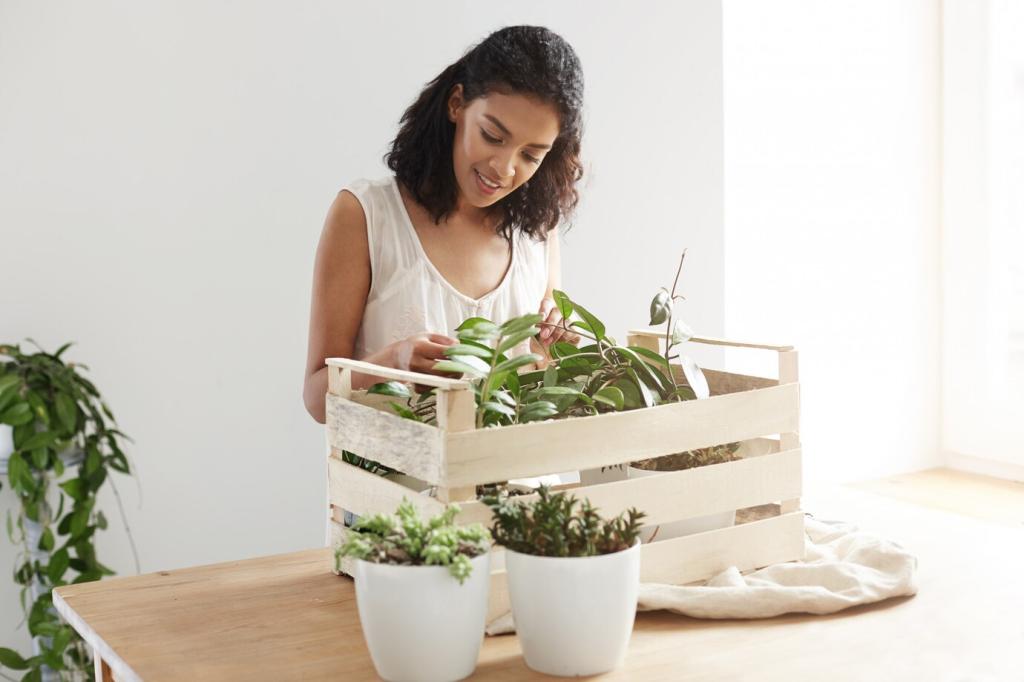
Eco-Friendly Storage Solutions
Embracing eco-friendly storage solutions is essential in today’s world, where sustainability and environmental consciousness are more important than ever. Creating organized spaces while reducing waste, energy consumption, and reliance on plastics can make a significant positive impact. This page explores the best practices, materials, and innovative approaches for making your storage methods greener, showcasing how small changes in how we store and organize our belongings contribute to a healthier planet for future generations.
Sustainable Materials in Storage Products
Bamboo is celebrated for its rapid regrowth and minimal resource requirements, making it a leading choice for sustainable storage. Products made from bamboo, such as baskets, boxes, and shelving units, offer durability and a natural aesthetic. Bamboo’s resistance to pests and its ability to thrive without harmful chemicals position it as an eco-friendly material for everyday storage needs. By integrating bamboo products into your home or workspace, you can minimize your ecological impact while enjoying high-quality, beautiful storage solutions.

Decluttering Responsibly
Donation and Redistribution Networks
Donating unneeded storage containers, shelving units, or organizational tools to local charities, schools, or shelters extends the lifespan of these products. Redistribution networks connect discarded items with those in need, reducing demand for new production and addressing community shortages. This approach ensures household decluttering happens mindfully, with goods staying in circulation rather than becoming landfill waste. It’s a meaningful way to combine tidying up with philanthropy.
Recycling with Care
When materials can no longer be reused or donated, careful recycling ensures they are processed appropriately. Proper sorting of plastics, metals, and glass containers avoids contamination and helps recycling facilities operate efficiently. Many cities provide specific guidelines or pickup services for items like worn-out storage bins, which should be followed to maximize recovery rates. Engaging in informed recycling demonstrates environmental responsibility, even in the act of discarding.
Safe Disposal of Non-Recyclables
Some storage products, particularly those containing composites or hazardous elements, aren’t recyclable through conventional means. Companies and municipalities may offer drop-off locations or collection events for safe disposal, preventing pollution and protecting natural ecosystems. Understanding the nature of different materials and how best to dispose of them is crucial for eco-friendly decluttering. It ensures that the impact of each discarded item is minimized, protecting the planet and public health.
Maximizing Small Spaces Sustainably
Modular storage units are inherently adaptable, allowing for additions or reconfigurations as needs change. This flexibility means that homeowners and renters alike can avoid buying entirely new systems when their storage demands shift, thus reducing waste. High-quality modular components made from recycled or renewable materials offer exceptional longevity, lowering both environmental and financial costs across time. Sustainable modular storage empowers people to make the most of limited space without constant consumption.
Innovations in Green Storage Design
Biodegradable Storage Containers
A growing number of companies are introducing storage containers crafted from materials like bioplastics, cornstarch blends, or mushroom-based composites. These biodegradable products offer strength and usability while ensuring that, at the end of their lifespan, they break down harmlessly. Unlike traditional plastics, they don’t persist in landfills or waterways for centuries, drastically cutting down on long-term pollution. Integrating biodegradable storage options into your routine helps eliminate plastic dependency and supports a healthier ecosystem.
Smart Storage for Energy Efficiency
Smart storage systems don’t just keep spaces tidy—they help conserve energy, too. Solar-powered storage sheds or cabinets with built-in LED lighting and automatic sensors can reduce household electricity usage. Some high-tech organizers monitor contents to minimize spoilage in pantries or refrigerators, cutting down on food waste. Adopting innovative, energy-saving storage designs harnesses technology for greater sustainability while enhancing everyday convenience.
Adaptive Recycled Material Use
Innovative storage makers now blend recycled glass, wood fibers, and even old textiles into stylish products. These storages solutions are not only attractive but provide second or even third lives to materials that would have otherwise been discarded. Manufacturers are investing in new processes to transform pre-loved materials into functional, high-quality storage items. These adaptive methods reflect a commitment to both creativity and environmental stewardship in product design.
Green Storage for Business and Industry

Businesses that choose storage products made with certified sustainable, recycled, or upcycled materials actively reduce their operational impact. Instituting sustainable policies extends beyond the storage rooms, influencing manufacturers to make greener choices and encouraging broader adoption across industries. Supply chain audits and environmental certifications help ensure that every step, from raw material sourcing to final product delivery, meets rigorous sustainability standards.
Reducing Toxicity in Storage Choices
Low-VOC and Non-Toxic Finishes
Choosing storage solutions finished with low- or zero-VOC (volatile organic compounds) paints, stains, or sealants ensures that indoor air quality isn’t compromised. These non-toxic finishes are especially important for items used in children’s rooms, kitchens, or other sensitive areas. Manufacturers adopting safer finishing processes offer peace of mind as well as environmental benefits. The reduction of harmful off-gassing is a crucial step toward holistic eco-friendly storage.

